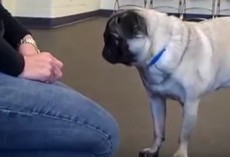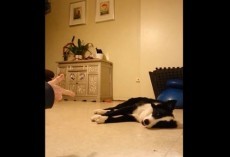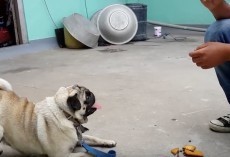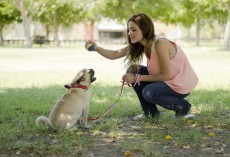If your doggy does have anxiety or is afraid of going outside to eliminate when it's raining outside, for example, figure out what is causing the anxiety. If it's another new doggy in the household or a new situation be patient with your pup. Check out these tips to help you with training below:
Some adolescent or adult dogs (over six months of age) urinate or defecate inside the house. House soiling can occur in any location of a home, but sometimes pet parents will notice that their dog soils more in certain locations. A dog might house soil if she’s previously learned to eliminate on papers or in a litter box and her pet parent removes the papers or box.
Note: If your dog soils indoors or at inappropriate times, it’s important to visit her veterinarian to rule out medical causes before doing anything else.
Rule Out Medical Problems First
If your dog soils indoors or at inappropriate times, it’s important to visit her veterinarian to rule out medical causes before doing anything else. Some common medical reasons for inappropriate urination and defecation follow.Gastrointestinal Upset
If your dog was house trained but now defecates loose stools or diarrhea in your house, she may have gastrointestinal upset.Change in Diet
If you’ve recently changed the amount or type of food you give your dog, she may develop a house-soiling problem. Often, after a diet change, a dog will defecate loose stools or diarrhea.Incontinence Caused by Medical Problems
Some dogs’ house soiling is caused by incontinence, a medical condition in which a dog “leaks” or voids her bladder. Dogs with incontinence problems often seem unaware that they’ve soiled. Before attempting to resolve your dog’s house-soiling problems through training, please see your dog’s veterinarian to rule out medical issues.Medications
There are a number of medications that can cause frequent urination and house soiling.Age-Related Incontinence/Cognitive Dysfunction
Some older dogs (usually at least nine years of age) who were once reliably housetrained start house soiling as they age because of arthritic conditions, weakness, loss of physical control, impaired cerebral function or loss of voluntary bladder control.Behavioral Reasons for House Soiling
Lack of House Training
If a dog has always soiled in the home, has lived outside or in a kennel, or has an unknown history, it’s likely that she simply has never been house trained.Incomplete House Training
Many dogs have been incompletely house trained. An incompletely house trained dog might occasionally soil in house, soil if she’s not given frequent enough opportunities to eliminate outside, soil only when left alone in the home for long periods, soil first thing in the morning or during the night, or soil if there’s a change in her family’s daily routine that alters her access to the outdoors.Breakdown in House Training
Some dogs appear to be house trained, but after a time they start to occasionally soil inside.A Surface Preference
If a dog only soils inside on a specific surface, such as carpeting, cement or newspaper, she may have developed a surface preference for elimination.Anxiety
A dog might be reliably housetrained until a major change happens in her household, such as the addition of a disliked individual or the permanent departure of a favored family member. Dogs who soil because of anxiety tend to eliminate on furniture, beds or sofas—areas that smell strongly of particular people or other animals.Fear of Going Outside
Some dogs are afraid to go outside, so they eliminate indoors. These dogs might only defecate inside, since defecation requires a more vulnerable position than urination.Dislike of Cold or Rainy Conditions
Some dogs hate to go outside when it’s cold, snowing or raining, so they soil indoors when the weather is bad.Urine Marking
Some dogs urinate in the house because they’re scent marking. Dogs scent mark for a variety of reasons, including to claim territory, to identify themselves to other dogs and let them know they’ve been there, and in response to frustration, stress or an anxiety-provoking situation.Separation Anxiety
If your dog only soils when left alone in your home, even for short periods of time, she may have separation anxiety.Submissive/Excitement Urination
Your dog may have a submissive or excitement urination problem if she only urinates during greetings, play, physical contact, scolding or punishmentWhat to Do About the Problem
Treatment for Lack of House Training, Incomplete House Training or a Breakdown in HouseTraining
If given a choice, dogs prefer to eliminate away from areas where they eat, sleep and play. You can accomplish house training by rewarding your dog for going where you want her to go (the yard, for example) and by preventing her from going in unacceptable places (inside the house).Useful Tips
• Keep your dog on a consistent daily feeding schedule and remove food between meals.
• Take your dog outside on a consistent and frequent schedule.
• Know where your dog is at all times. Watch for early signs that she needs to eliminate so that you can anticipate and prevent accidents from happening.
• If you can’t watch your dog, you must confine her to a crate, put her in a small room with the door or a baby gate closed, or tie her to you with a leash that’s approximately six feet long.
• Accompany your dog outside and reward her whenever she eliminates outdoors with praise and treats.
• If you catch your dog in the act of urinating inside the house, clap loudly, just enough to startle but not scare your dog.Paper Training
Paper training your dog is not recommended unless there is a specific reason to do so.
Training a puppy or dog to use a papered area in your home is accomplished in much the same way as training her to go outside.Treatment for House Soiling Due to a Surface Preference
A dog will usually prefer to eliminate on whatever surface she used as a six- to ten-week-old puppy.In addition to following the instructions for house training, you can combine your dog’s preferred elimination surface with your desired surface.
Treatment for House Soiling Due to Fear of Going Outside
A country dog who moves to an urban environment or a dog who has never been outdoors—say, one who was raised in an indoor kennel or laboratory, or one who was trained to go on paper inside and was never taken outside—can sometimes feel so overwhelmed that she will not eliminate outside. Some dogs will urinate but not defecate, probably because defecating puts a dog in a more vulnerable position.In addition to our recommendations for general house training, you can try the following suggestions:
• You might need to let your dog become comfortable outside before you can expect success with house training. Take your dog to a quiet area outdoors and spend time there. Drive to a quiet park or establish an area in your yard for elimination. If you are using your yard, it may help to invite a friend’s dog over to hang out with you (assuming that your dog enjoys that dog’s company). Sometimes the sight and smell of another dog eliminating will prompt a reluctant dog to go. Alternatively, you can try depositing urine from another dog in the area where you’d like your dog to eliminate. The odor alone might prompt your dog to eliminate.
• If you have a balcony or deck but no yard, put down a plastic tarp and cover it with grass sod. This might just be a short-term step until your dog gets used to her new environment. (To try this option, you must have an enclosed, secure balcony to ensure the safety of your dog.)Treatment for House Soiling Related to Bad Weather
There are a few dogs who are perfectly house trained—except when the weather is bad and they don’t want to go outside.In addition to our recommendations for general house training, you can try the following suggestions:
• Minimize the unpleasantness of bad weather by dressing your dog appropriately.
• Build an overhang for your yard to protect your dog from the elements.
• If you have a covered balcony or deck, put down a plastic tarp and cover the tarp with grass sod.Treatment for Anxiety-Induced House Soiling
While it’s quite rare, some dogs who were once reliably housetrained seem to lose their training after a major change occurs in the household, such as the addition of a disliked individual or the departure or death of a favored family member or pet.
In addition to our recommendations for general house training, you can try the following suggestions:
• Try to deal with conflicts between family pets. If one of the pets is new, you can reintroduce them.
• If your dog seems upset by the addition of a new person to your household, try to deal with conflicts between your dog and the new resident.
• If your dog regularly eliminates on objects like beds, furniture and clothing, place treats under and around those objects.
• Clean all accidents with an enzymatic cleaner to minimize odors that might attract your dog to eliminate in the same spots again.
• Consult with your veterinarian about trying medication in addition to behavior training. Scientific studies show that the use of anti-anxiety medications can reduce dogs’ anxiety.What NOT to Do
• Do not rub your dog’s nose in her waste.
• Do not scold your dog for eliminating indoors.
• Do not physically punish your dog for accidents. Do not hit her with newspaper, spank her or jerk her collar. Realize that if your dog has an accident in the house, you failed to adequately supervise her, you didn’t take her outside frequently enough.
• Do not crate your dog if she soils in the crate.
I would like to note that in addition to paper training there are other ways for a dog to go to the bathroom inside of an apartment. If a dog prefers grass there are puppy grass mats available. Your pup can go to the bathroom on the mat and most of the mats have a separation for the pee to drain.
No matter what your pooch is going through stay consistent and loving throughout the training process. Just like ASPCA recommends, when he does eliminate in the desired area it's important to reward him with praise and treats. Continue your training process and if you run into frustrations along the way consult with your vet and a behavior specialist if needed.











Barbara Carney-Klein
- Edit
They can be trained at any way!